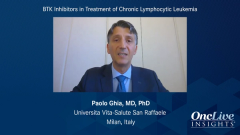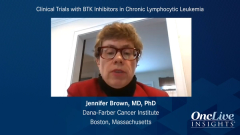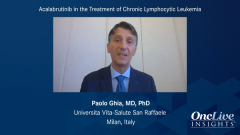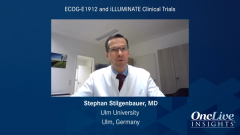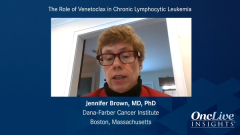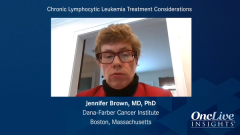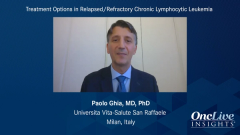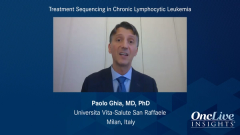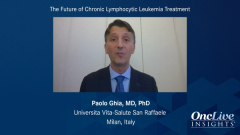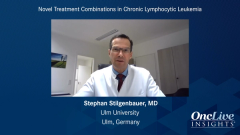
Frontline Treatment Options in Chronic Lymphocytic Leukemia
The experts comment on first-line treatment options in patients with chronic lymphocytic leukemia.
Episodes in this series

Transcript:
Stephan Stilgenbauer, MD: When it comes to the choice of a frontline treatment in CLL [chronic lymphocytic leukemia], several factors become of importance. On the 1 side, there are patient characteristics such age, comorbidities, and comedications. Here, there is also a role for decision-making together with the patient. For instance, with some of the new treatment options such as BTK [Bruton tyrosine kinase] inhibitors, I have long, indefinite treatment duration for our patients. Other new treatment options, such as BCL2 inhibitors, require dedicated tumor lysis syndrome monitoring and prophylaxis, sometimes in hospital stays when treatment is initiated.
Patient preference is of particular importance when it comes to questions such as, “Do I want finite treatment duration?” or “Do I want to add a gentle treatment that does not require extensive monitoring?” From a disease characteristic standpoint, we have high-risk disease features such as unmutated immunoglobulin mutation status or IGHV, 17p deletion, or TP53 mutation, which are the prime characteristics defining high-risk disease. Therefore, these are patient populations that would benefit very much from the novel treatment options.
Jennifer Brown, MD, PhD: The choice of frontline therapy for patients with CLL has gotten even more complicated than it was before. It is important to do certain key prognostic markers prior to trying to decide on therapy. These include a FISH [fluorescence in situ hybridization] test for 17p deletion, a somatic mutation profile for TP53 mutation, which we treat similarly to 17p deletion, and IGHV mutation status. Those are the key determinants that dictate therapeutic choices from the CLL biology standpoint.
Factors that also play into this are the fitness of the patient and their age. The younger and more fit they are, the more I tend to favor time-limited therapy where possible. As patients get older, I often find that they want an easier option that involves fewer visits to the clinic. In that case, it is sometimes the single-agent continuous BTK inhibitor. That is a patient-choice phenomenon. Key comorbidities that are more important than overall functional status with the targeted agents include cardiac problems, like low ejection fraction or history of arrhythmia, which would be more difficult to manage in a patient receiving ibrutinib, for example.
The next-generation covalent BTK inhibitors may improve on that. We have some new data emerging at ASH [American Society of Hematology Annual Meeting] 2020 that suggests a lower risk of cardiac complications with acalabrutinib, and we are awaiting a head-to-head trial of acalabrutinib vs ibrutinib. At the moment, cardiac issues remain something I worry about in patients in whom we would consider ibrutinib as well as anticoagulation. For venetoclax-based regimens, renal function is a critical parameter because the ability of the patients to clear the dying tumor cell helps us mange tumor lysis.
Generally, I sit down and have a discussion with the patient about time-limited therapy, which for young, fit patients could include FCR [fludarabine, cyclophosphamide, rituximab]. For older patients, it is venetoclax and obinutuzumab. FCR [fludarabine, cyclophosphamide, rituximab] is mostly for patients with IGVH mutations. For unfit patients, time-limited treatment would be venetoclax and obinutuzumab vs the continuous BTK inhibitor therapy, and the pluses and minuses and what we know about the data.
With an approximately 3-year follow-up, the progression-free survival looks quite similar with continuous BTK inhibitor vs venetoclax and obinutuzumab, for example. We are still awaiting long-term follow-up and a head-to-head trial to help guide these sessions more effectively.
Transcript Edited for Clarity




